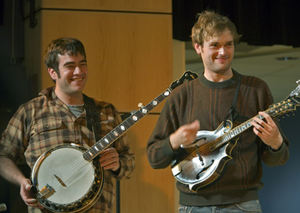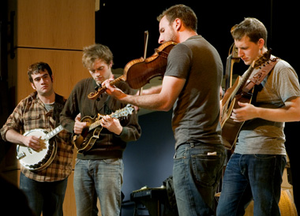Beyond Nickel Creek

The Punch Brothers take requests and questions from the packed hall.
Photo by Bill Gallery

Punch Brothers Noam Pikelny and Chris Thile compete to have the best licks—musical licks and cowlicks.
Photo by Bill Gallery

The Punch Brothers break it down: (left to right) Pikelny, Thile, Gabe Witcher, Chris Eldridge; (hidden) Greg Garrison
Photo by Bill Gallery
When bluegrasser Chris Thile titled his 2001 album Not All Who Wander Are Lost, he sent a message: don't expect me to follow a narrow path. At a packed clinic with his band the Punch Brothers on April 7, the mandolin wunderkind showed he sets his own, innovative direction.
Thile hit the bluegrass big time early-he started playing festivals with Nickel Creek when he was only eight years old. The Grammy-winning band, which broke up last year, gradually expanded its repertoire from traditionals to rock covers, and its sound from twang to folk-pop. Now Thile's new band the Punch Brothers takes on a new challenge: blending bluegrass with contemporary classical.
True, the quintet—Thile plus guitarist Chris "Critter" Eldridge, bassist Greg Garrison, banjoist Noam Pikelny, and fiddler Gabe Witcher—played bluegrass standards upon audience request. But their heart shone through selections from their new album Punch. The heavily syncopated "Punch Bowl" set bluegrass melodies against each other in several keys at once. The final chord sounded like someone throwing a piano down the stairs.
Punch also includes a 40-minute chamber piece called "The Blind Leading the Blind" whose fourth movement alternated between pattern and mayhem.
"The hypothesis was that the bluegrass quintet lends itself to really any purpose-well, maybe not as balanced as a string quartet but certainly as balanced as a wind quartet," Thile explained to the rapt crowd. "I had a pretty intense desire to turn my hand to long-form composition, and this is what I know."
Though the lead auteur, Thile clearly didn't see himself as the star. The Punch concept only gelled when he started playing with the Brothers, he said. "The Blind Leading the Blind" is about 65 percent composed and 35 percent improvised, Thile said, landing "squarely between formal and folk composition."
Thile was largely responsible for the songs' content, which concerns his recent divorce-more or less. "More important than what you're trying to say is how it sings," he said. He pointed at Dylan as an example: "There's a lot of meaning, but never at the expense of how it sings or sounds."
He clarified, "I don't think he was necessarily thinking what it meant [and] because of that, his songs are beautifully open to interpretation.... It's not just him beating you over the head with his thoughts. You have a deeply personal interaction with a Dylan song."
Though the songs were sad, the band seemed relaxed, joking about playing so early in the morning. (The clinic started at 2:00 p.m.) Pikelny asked for the Cubs score; Thile snagged a bottle of water from an audience member.
The attitude spilled over. One fan called out, "How do you get your hair so pretty? Is that just bed head?"
As Thile started to explain, Pikelny interrupted: "You just assume that he's asking you."
"How do you get your hair so pretty?" Thile countered.
Pikelny folded his hands. "It's a gift," he said.
Was the same true of the band's spectacularly nimble playing? Pikelny's fingers barely seemed to move. Still, when an audience member asked about picking technique, the band members self-deprecatingly presented themselves as works in progress.
"I can't get good tone and play fast, which is something I'm working on," Eldridge said. "Pick angle is important and so is staying loose, but I can only do it at slow speeds for a bluegrass guy."
Pikelny warned against letting one-upmanship damage technique. When musicians start trying to outdo each other, "you're just going to be overplaying."
"I find that if I think about projecting instead of volume it all comes together in the right way," Eldridge recommended.
Thile suggested training your body instead of relying on equipment. "My whole thing is to try to keep the right hand as anatomically correct as possible," he said. When your entire right arm is aligned properly, "the finished downstroke, properly executed, sort of shoots your arm back up naturally." He added, "It's now only really reliable for me when I'm dialed in."
With his interest in artistic growth and shape-shifting, Thile's appreciation for Berklee wasn't unexpected-though the way he put it was.
"Most conservatories have a very set path for you to follow. This seems like a place for people who are confused about music," he said after the clinic. From Thile, that's a compliment. "Life is confusing, and music should emulate life, so music should be confusing.... I'm really happy to be part of it."
He concluded, "It's all a big mystery."
